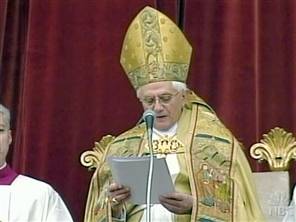Image Source: Getty Images
Mr President,
Distinguished Authorities,
Dear Brother Bishops,
Ladies and Gentlemen,
Only now has it been possible for me to accept the kind invitations of the President and my Brother Bishops to visit this beloved and ancient Nation, which this year is celebrating the centenary of the proclamation of the Republic. As I set foot on Portuguese soil for the first time since Divine Providence called me to the See of Peter, I feel greatly honoured and I am moved to gratitude by the respectful and hospitable presence of all of you. I thank you, Mr President, for your kind words of welcome, giving voice to the sentiments and the hopes of the beloved Portuguese people. To all, whatever their faith or religion, I extend a greeting in friendship, especially to those who were unable to be here to meet me. I come as a pilgrim to Our Lady of Fatima, having received from on high the mission to strengthen my brothers as they advance along their pilgrim journey to heaven.
Since the earliest days of their nationhood, the Portuguese people have looked to the Successor of Peter for recognition of their existence as a Nation; in due course, one of my predecessors was to honour Portugal, in the person of its King, with the title "most faithful" (cf. Pius II, Bull Dum Tuam, 25 January 1460), for long and distinguished service to the cause of the Gospel. As for the event that took place 93 years ago, when heaven itself was opened over Portugal -- like a window of hope that God opens when man closes the door to him -- in order to refashion, within the human family, the bonds of fraternal solidarity based on the mutual recognition of the one Father, this was a loving design from God; it does not depend on the Pope, nor on any other ecclesial authority: "It was not the Church that imposed Fatima", as Cardinal Manuel Cerejeira of blessed memory used to say, "but it was Fatima that imposed itself on the Church."
The Virgin Mary came from heaven to remind us of Gospel truths that constitute for humanity -- so lacking in love and without hope for salvation -- the source of hope. To be sure, this hope has as its primary and radical dimension not the horizontal relation, but the vertical and transcendental one. The relationship with God is constitutive of the human being, who was created and ordered towards God; he seeks truth by means of his cognitive processes, he tends towards the good in the sphere of volition, and he is attracted by beauty in the aesthetic dimension. Consciousness is Christian to the degree to which it opens itself to the fullness of life and wisdom that we find in Jesus Christ. The visit that I am now beginning under the sign of hope is intended as a proposal of wisdom and mission.
From a wise vision of life and of the world, the just ordering of society follows. Situated within history, the Church is open to cooperating with anyone who does not marginalize or reduce to the private sphere the essential consideration of the human meaning of life. The point at issue is not an ethical confrontation between a secular and a religious system, so much as a question about the meaning that we give to our freedom. What matters is the value attributed to the problem of meaning and its implication in public life. By separating Church and State, the Republican revolution which took place 100 years ago in Portugal, opened up a new area of freedom for the Church, to which the two concordats of 1940 and 2004 would give shape, in cultural settings and ecclesial perspectives profoundly marked by rapid change. For the most part, the sufferings caused by these transformations have been faced with courage. Living amid a plurality of value systems and ethical outlooks requires a journey to the core of one’s being and to the nucleus of Christianity so as to reinforce the quality of one’s witness to the point of sanctity, and to find mission paths that lead even to the radical choice of martyrdom.
Dear Portuguese brothers and sisters, my friends, I thank you once more for your cordial welcome. May God bless those who are here and all the inhabitants of this noble and beloved Nation, which I entrust to Our Lady of Fatima, the sublime image of God’s love embracing all as children.
© Copyright 2010 -- Libreria Editrice Vaticana








.jpg)
.jpg)
.jpg)

.jpg)

.jpg)



.jpg)
.jpg)






